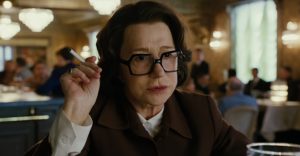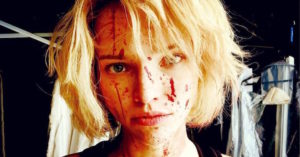There is in Luc Besson’s ANNA fully one-third of a very good movie. That third is a finely drawn satire, cartoonishly violent in its sublimation of female rage as it addresses female exploitation in the modern world using the milieus of espionage and modeling as the metaphor. The other two-thirds is a plodding retread of Besson’s own LA FEMME NIKITA. He’s even set it in roughly the same time frame (circa 1990) as that far superior work. Alas, Sasha Luss as Anna is no Anne Parillaud, and the impudent comedy, that manifests itself in dribs and drabs before Cillian Murphy brightens things up as a CIA agent with a mordant sense of humor and the perfectly composed straight-face to deliver it impeccably, arrives too late and too unsurely to make the whole worthwhile.
Until then, there is the well-worn tale of a desperate girl, that would be Anna, with no real future and a present of being tormented by her pig of a boyfriend who rescued her from the streets of Moscow after her parents died. As in NIKITA, she is offered a way out by a shadowy government agent, Alex (the brooding, dashing Luke Evans). It seems Anna has, ahem, a particular skill set in which the KGB is interested. She can, of course, say no, but to do so would result in being shot dead by Alex in the same cold-blooded way that he shot her pig of a boyfriend right in front of her. What Anna really wants is freedom (another metaphor on which Besson harps incessantly but not profoundly). A deal is struck, and Anna is trained to be an elite assassin as well as being hired by a French modeling agency. This is a Luc Besson film, after all. It also gets her to Paris where Besson is based, and where an intriguing number of operations are carried out by the KGB.

Helen Mirren
For reasons not adequately explained, Anna’s handler, the deputy director of the KGB is always on hand in Paris and other west European locations when Anna is called into action. It makes no sense, particularly when we are shown the KGB’s ability to watch anyone anywhere, but it means that we get to enjoy Helen Mirren as a cranky chain-smoker character whose humor is as mordant as Murphy’s, and more deadly. When Anna complains that a gun she was given for a kill wasn’t loaded, resulting in a bloody free-for-all in a crowded restaurant, Mirren’s cool response, that she should always check her equipment before going in, defines an apparatchik with priorities that don’t include sentimentality. She manages to be heartless and to make it completely impersonal, but with just a hint of amusement.
It’s another of those clues dropped awkwardly before Murphy takes center stage that Besson is essaying a black comedy. And that’s a bad thing. Primed as we have been for a middling action flick, it takes far too long to realize things like Anna and Alex’s Moscow reunion, which results in torn clothing, heavy breathing, and broken furniture as they consummate their simmering lust, is a send-up.

Sasha Luss
As is wont in the genre, nothing is quite as it seems, leaving everything open to interpretation. A clever device that falls flat. The first half-dozen flashbacks that fill in details of action we’ve just seen are fine, but the second half-dozen bring with them the whiff of preciousness, and the further dozen are so become just laughable. As does Anna’s speech about being like the matryoshka dolls she used to sell. Aside from being painfully obvious, it’s declaimed while her character has countless guns trained on her, and in the same curious, expressionless monotone that Luss evinces throughout.
No. Just no.
Even Cillian’s presence in the moment can’t make that right. And he, like Mirren, makes so much that shouldn’t work here enjoyable.
There is a great film to be made that juxtaposes the commodification of the female form in a patriarchy with the use of that form to break the chains of said patriarchy. ANNA is not it.
Your Thoughts?